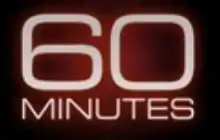Barry Lando
Barry Lando (born June 8, 1939) is a Canadian journalist, author, and former producer for CBS' 60 Minutes.[1]
Barry Lando | |
|---|---|
| Born | 8 June 1939 |
| Nationality | Canadian |
| Occupation(s) | Journalist, Author and Producer |
| Television | CBS' 60 Minutes |
| Website | http://BarryMLando.com/ |
Career
Lando graduated from Harvard University in 1961[2] and Columbia University. He was a producer for 60 Minutes for over 25 years, most of those producing stories for Mike Wallace.[3] Lando produced the first interview with the Ayatollah Khomeini after the 1979 Iran hostage crisis, which aired 14 days after the hostages were captured.[4] Another famous story he produced was on the 1990 Temple Mount riots.[5] Wallace said of Lando and another producer, "if it wasn't for [Marion Goldin] and Barry there would be no 60 Minutes."[6]
Lando pioneered the use of hidden cameras for investigative television reporting.[6] He was awarded a George Polk award for Television Reporting in 1977.[7] Lando and Wallace won a Robert F. Kennedy Journalism award in 1990 for the segment "40,000 a Day."[8] Lando also won two Emmys at 60 Minutes.[9]
In 2004, Lando collaborated with Michel Despratx to produce a documentary for Canal+ called "Saddam Hussein, the Trial the World Will Never See."[10] Lando's 2007 book, Web of Deceit: The History of Western Complicity in Iraq, From Churchill to Kennedy to George W. Bush, covered 85 years of Western intervention in Iraq.[11][12] Lando has written for The Atlantic, the Los Angeles Times, the Christian Science Monitor, the International Herald Tribune, and Le Monde.[9]
Herbert v. Lando
Colonel Anthony Herbert sued Lando and Wallace for libel for a 1973 60 Minutes broadcast that painted Herbert as a liar.[13] The case reached the United States Supreme Court as Herbert v. Lando 441 U.S. 153 (1979).[14][15] It was part of a series of appellate cases that set the boundaries of the press's right to publish information about private and public figures and an important authority for plaintiffs in defamation cases.
References
- O'Keefe, Derrick (January 31, 2007). "Web of Deceit By Barry M. Lando". Georgia Straight. Vancouver. Retrieved 8 July 2015.
- "Students to Start New Publication". Harvard Crimson. March 10, 1962. Retrieved 15 July 2015.
- Lando, Barry (June 9, 2012). "My Quarter Century With Mike Wallace". Huffington Post. Retrieved 9 July 2015.
- "1970s: Talking back to the Ayatollah Khomeini". CBS News. Retrieved 9 July 2015.
- Lando, Barry (April 12, 2012). "Remembering Mike Wallace, A Jew Unafraid of the Truth". Forward. Retrieved 9 July 2015.
- Rader, Peter (2012). Mike Wallace: A Life. Macmillan. ISBN 9781466802254. Retrieved 9 July 2015.
- "1977 George Polk Award Winners". Long Island University. Retrieved 8 July 2015.
- Carmody, John (April 11, 1990). "The TV Column". Washington Post. Retrieved 8 July 2015.
- "Barry Lando". Huffington Post. Retrieved 8 July 2015.
- "Saddam's fair trial documentary". SBS. October 25, 2004. Retrieved 9 July 2015.
- "WEB OF DECEIT by Barry Lando". Kirkus Reviews. November 15, 2006. Retrieved 8 July 2015.
- "Barry Lando on 'The History of Western Complicity in Iraq, From Churchill to Kennedy to George W. Bush'". Democracy Now!. January 30, 2007. Retrieved 8 July 2015.
- Lubasch, Arnold H. (January 16, 1986). "COURT THROWS OUT LIBEL SUIT FILED AGAINST CBS BY COLONEL". New York Times. Retrieved 8 July 2015.
- "HERBERT v. LANDO". FindLaw. Thomson Reuters. Retrieved 8 July 2015.
- Gray, Brian E. (1978). "Herbert v. Lando: State of Mind Discovery and the New York Times v. Sullivan Libel Balance". Cal. L. Rev. 66 (5). doi:10.2307/3479908. JSTOR 3479908. Retrieved July 8, 2015.
Further reading
- Coffey, Frank (1993). 60 Minutes: 25 Years of Television's Finest Hour. General Publishing Group. ISBN 9781881649045.
- Einstein, Daniel (1997). Special Edition: A Guide to Network Television Documentary Series and Special News Reports, 1980-1989. Scarecrow Press. ISBN 9780810832206.
- Rader, Peter (2012). Mike Wallace: A Life. Macmillan. ISBN 9781466802254.
External links
- Lando, Barry (June 9, 2012). "My Quarter Century With Mike Wallace". Huffington Post. Retrieved 9 July 2015.
- Excerpt from Web of Deceit
- The Trial of Saddam Hussein. 1994 documentary for Canal+.
- Lando, Barry (July 2, 2007). "The West in Iraq". The Leonard Lopate Show (Interview). Interviewed by Leonard Lopate. WNYC. Retrieved July 14, 2015.
- Personal website
